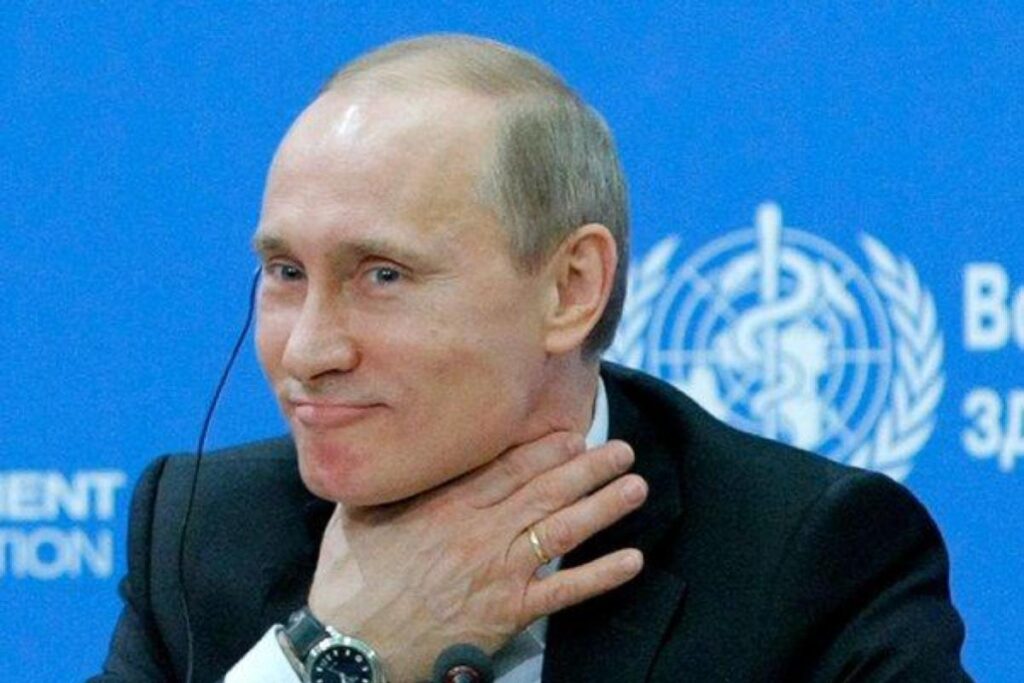Despite heavy sanctions imposed by the West, Russia continues to advance in Eastern Ukraine. Grandeur containment plans have failed to deter Russia. Hence, after more than four months of invasion, one should evaluate the success of sanctions – not in terms of damage inflicted on Russia but the effect on the pace of war.
The war of attrition is gradually becoming a reality as Russia continues to make gains in the east. According to Ukrainian officials, Russian forces now completely control the eastern Ukrainian city of Severodonetsk. Fresh missile strikes are again rattling the short-lived dormancy in Kyiv. And despite new military aid packages by the US and European Union (EU), Ukrainian armed forces are struggling in Donbas as a brutal Russian offensive is underway — troops now controlling over 20% of Ukrainian territory, according to president Zelensky. Analytical estimates reveal that Russia (alongside pro-Russian rebels) has already seized almost 90% of eastern Donbas; en route to upend the city of Lysychansk in the province of Luhansk. And geopolitical experts believe a similar showdown in the neighboring Donetsk province would ease Russian domination over the entire Donbas region.
The Ukrainian dignitaries have consistently insisted on long-range artillery support to counter Russia’s onslaught. However, a single contention prevails in the Western cohort: supplying long-range weaponry could enable Ukrainian attacks beyond Russian borders, perhaps invoking a direct conflict with a belligerent Russia. Thus, the Western support remains mostly limited to conservative alternatives as Russia defies earlier odds to gain an upper-hand. While German heavy weapons belatedly arrived in Ukraine, the core Western defense has largely been the barrage of sanctions imposed on Russia and the damage to the Russian economy. The West believes it could avoid militarily provoking Russia and still economically debilitate the Kremlin to the point of desperate negotiations. However, the truth is far divergent from this popular belief.
Russian Economy Stabilizes
Even after four months, the torrent of sanctions has failed to decimate the Russian economy as initially envisioned by the West. Putin has spent the last two decades fortifying the Russian economy; integrating into the global financial apparatus. Sure, the invasion in late February spurred financial restrictions and constraints on trade. But the initial panic has since receded as relative stability is taking on the reins. The Central Bank of Russia has played a pivotal role in preventing a financial collapse. As sanctions threatened to precipitate a crisis, the Bank of Russia hiked the policy rate to 20% – encouraging savings; preventing the egress of investments. The Kremlin mandated the state-owned enterprises to hold export receipts in Roubles. And salaries and pensions were generously increased to compensate for the inflationary effects of the invasion. Four months forward, the interest rates are back to the pre-invasion level of 9.5%. The Rouble – crashing to a record low in days following the invasion – is trading near four-year highs. And inflation, though still a vice, has relatively cooled off to 17% year-on-year from a two-decade peak in April. While fiscal and monetary policies have considerably stabilized the economy, another underlying factor has unsurprisingly buttressed the rebound: the Russian energy sector.
The Rallying Energy Sector
Foreign companies are pulling out, investments are downgrading, and currency reserves are locked up around the globe. Then how exactly is Russia financing the war in Ukraine? Sure the stocks of imports are running low, and people are spending less. Yet how is the Russian war machine still operational when the world is closing up for Russia? Ironically, the world is indirectly financing the Russian agenda in Ukraine. Fossil fuel exports have always been monumental for the Russian economy. Receipts from oil and gas exports made up roughly 45% of Russia’s federal budget in 2021. According to a market report of the International Energy Agency (IEA), Russia’s oil revenue alone is up by 50% this year – despite the toughest raft of sanctions ever meted out by the West. The US has utterly banned Russian energy imports while the EU has managed to reduce its reliance on Russian energy supplies. According to the data from the Center for Research on Energy and Clean Air (CREA) – a Finnish nonprofit think tank – the EU lowered natural gas imports from Russia by 23% in the first 100 days of the invasion (February 24 to June 3) compared to the same period last year. The data further reveals that the EU reduced its oil imports from Russia by 18% in May. Still, Russia earned a record $97 billion in revenue from exports of fossil fuels despite a modest fall of 15% in export volumes. How is that possible?
.
.
Despite trading at roughly 30% discount from international prices, Russian crude is sailing as surging global oil prices are still fetching receipts over 60% higher compared to last year. According to the Russian Ministry of Finance, fossil fuel revenues have already surpassed last year’s budget projections. Albeit the volumes have certainly lowered as many countries have refused to trade with Russia to avoid American fury. Yet some countries have contended for cheap Russian energy supplies to guard domestic economic interests. India has been surprisingly vocal and determined about its choices of self-interest despite Western pressure. “Buying Russian gas is not funding the war,” quipped S.Jaishankar – India’s Minister of External Affairs – taking a jibe at European countries still importing the majority of their natural gas via Russian pipelines. Since the invasion, India has procured 27% of its crude needs from Russia – up from less than 5% in April. According to research, India has cumulatively imported roughly 18% of Russia’s total oil exports since the invasion – increasing from roughly 1% pre-war quota. China has been another noteworthy importer of cheap Russian oil, building its strategic reserves amid high global oil prices. Despite agreeing on a partial embargo banning roughly three-quarters of Russian oil imports to the region, even Europe would not cast a substantial blow to Russia until 2023. While criticizing India and China for purchasing Russian oil, Europe has perhaps neglected its own energy imports from Russia, approximating €57 billion (75% of Russia’s revenues from fossil fuels) in the first 100 days of the invasion. And in spite of lofty promises to wean off Russian energy, European countries like Hungary and Slovakia would continue to rely on Russian oil through pipelines till at least 2024. Hence, while the West convenes to topple Russian dominance in Ukraine, the efforts are unfortunately not enough to fluster Putin – at least in the short run.
Lagging Sanctions and Future Outlook
Nonetheless, the sanctions would hurt Russia somewhere down the line. The Group of Seven (G7) richest democracies – including Canada, Britain, Italy, Japan, Germany, France, and the US – recently agreed to impose an embargo on Russian gold exports, its second-most lucrative export commodity besides energy supplies. The plan of setting a price cap on Russian oil supplies was under serious debate at the G7 summit. And Russia’s first foreign debt default in over a century implies that Putin is finally feeling the brunt of his barbarism – even if the impact is merely symbolic. Even Elvira Nabiullina – Governor of the Bank of Russia – recently admitted: “The effect of sanctions has not been acute as we feared at the beginning. [However] it would be premature to say that the full effect of sanctions has manifested itself.” Thus, while the windfall energy export receipts may continue; the import shortfall would eventually erode the productivity of other sectors of the Russian economy.
However, we need to understand that this is a war of attrition. The ambitious plan to cap Russian oil revenues is still very much an ambition; without any concrete structure or broader consensus. “The price cap policy would not put Russia under the immediate fiscal stress many expect,” said Mark Mozur, a market analyst for S&P Global Commodity Insights. Defiance from bigger buyers not wielding sanctions against Russia – like India and China – would render the strategy futile. One should not disregard that Europe has time and again struggled to reach a convincing consensus apropos of Russian energy supplies. And we should also realize the frustration of the United States evident from the cartel-like strategies in focus at the G7 summit. According to Barclays – a UK-based analyst firm – if Putin caps a few oil wells in retaliation, the oil prices could reach $200/barrel by next year. Evidently, the G7 strategy could just as easily backfire. And (despite running a budget deficit) Russia would still have enough fiscal room to finance its domestic and military needs shortly. Simply put, Russia seems to be prepared if oil revenues plummet. However, one could not say the same about Europe and potentially choking Russian oil supply.
Mr.Richard Connolly – Director of the Eastern Advisory Group – sums up the reality perfectly: “For as long as the political will is there in the Kremlin and for as long as export prices remain high, I don’t see any immediate financial constraints confronting the Kremlin.” Hence, as sanctions fall short and Ukrainian defense fissures, the outlook is bleak – especially when Kyiv is resistant to negotiate territorial gains to fend off a humanitarian catastrophe. Ultimately, the West needs to acknowledge its failure and decide: Is the sluggish war in favor of Ukraine or Russia? And what would be the primary goal of negotiations if Russia gains enough territory to dictate the terms? Instead, the West is focused on recalibrating NATO and expanding perilously closer to Russian borders. Putin has blatantly claimed that the war stops immediately on one condition: complete surrender of Ukraine. It’s ruefully intriguing how the West is moving in the absolute perverse direction of resolve. Given how the West has already exhausted almost all of its economic options and presuming that direct military options remain off the table, I wonder how even the negotiations could do any good to Ukraine in the foreseeable future.
.
July 5, 2022 Published by The Geopolitics.







